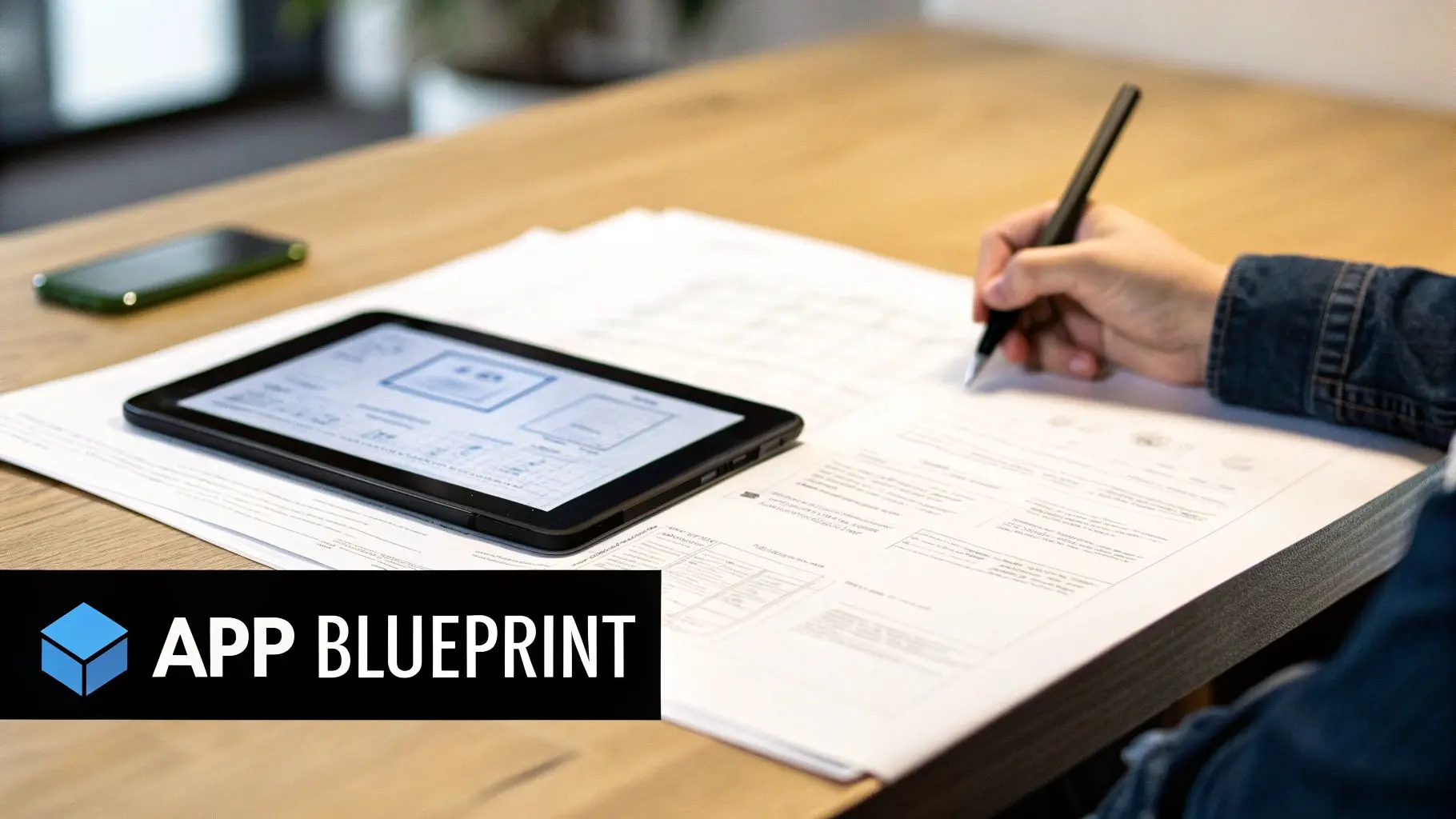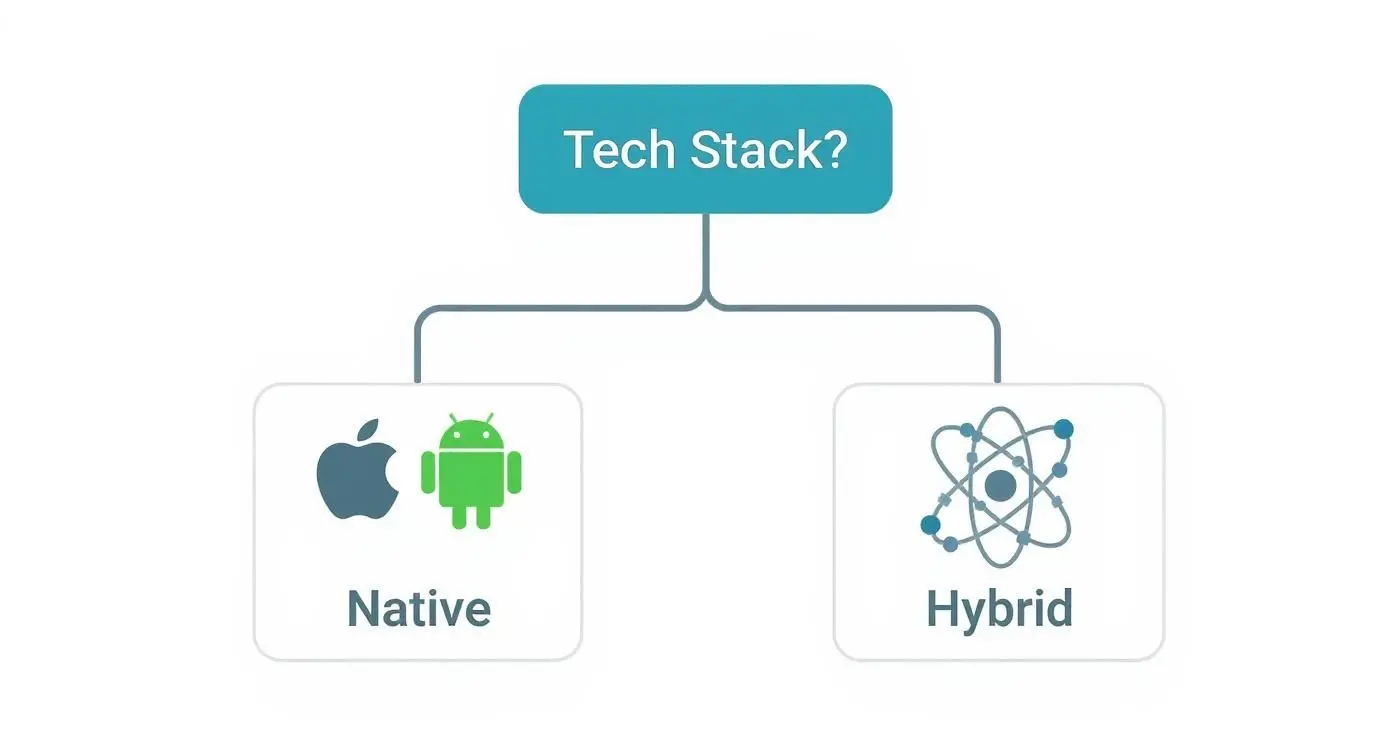How to Find and Choose the Right Mobile App Development Agency
Hiring a mobile app development agency without a clear plan is like setting off on a road trip with no map. Before you find the right partner, you need to turn your brilliant idea into a solid blueprint they can work with. Getting this initial planning phase right is non-negotiable for success.
Laying the Groundwork: Define Your Project Before You Search

Jumping into calls with agencies before you've done your homework is a recipe for confusion, mismatched expectations, and wasted time and money. The best partnerships begin when the client walks in with a well-defined vision. This means going beyond a vague concept to get crystal clear on your app's core purpose, its target audience, and the specific problems it solves. To help you get organised, use this simple checklist. Answering these questions internally gives you a clear and actionable brief to share with potential mobile app development agencies, making those initial conversations far more productive.
Your Pre-Search Checklist for Hiring an App Agency
| Category | Key Question to Answer | Example |
|---|---|---|
| Purpose & Goal | What is the single most important thing this app needs to achieve? | "To increase our takeaway food sales by 20% in the first year." |
| Target Audience | Who are we building this for, specifically? | "Busy professionals aged 25-40 in urban areas who value convenience." |
| Core Problem | What specific pain point are we solving for them? | "They struggle to find and order from high-quality, local restaurants quickly." |
| Core Features (MVP) | What are the absolute must-have features for launch? | "User registration, menu browsing, secure checkout, and order tracking." |
| Budget Range | What is our realistic, all-in budget for this project? | "We have a budget of £30,000 to £50,000 for the initial MVP development." |
| Timeline | What is our ideal launch date or timeframe? | "We want to launch the app within the next 6-8 months." |
Once you've thought through these points, you'll have a much stronger foundation for your project and a much clearer picture of the kind of partner you need.
Nailing Down Your Core Purpose and Audience
First, what’s your "why"? Is this app meant to boost sales, streamline internal operations, improve customer service, or create a brand-new revenue stream? A clear purpose acts as your North Star, guiding every decision. Next, get specific about your target user. "Everyone" is not a viable audience. Build a detailed user persona:
- •Demographics: Age, location, job, and income.
- •Behaviours: How tech-savvy are they? What are their daily digital habits?
- •Pain Points: What specific frustrations will your app eliminate?
Understanding your audience is the only way to build features they'll actually use and value. This is also the time to start planning for effective mobile app marketing strategies from day one.
Define Your Minimum Viable Product (MVP)
You don’t need to build every feature you’ve ever dreamt of for the first version. The smart move is to define a Minimum Viable Product (MVP). This is the simplest version of your app that solves one core problem for your target users. It's about launching faster, getting real-world feedback, and then iterating based on data.
An MVP isn't about launching an incomplete product; it's about launching the right product. Prioritise features using the "must-have," "should-have," and "nice-to-have" framework. Your MVP should consist only of the must-haves.
Set a Realistic Budget and Timeline
Finally, let's talk money. Mobile app development costs in the UK can vary wildly, from £11,000 to £125,664 or more, depending on complexity. Having a realistic budget range is crucial. It helps you filter out agencies that aren't a good fit and keeps conversations grounded in what's achievable. With these pieces in place, you have a powerful brief to take to potential mobile app development agencies. It shows you're serious and ensures your first conversations are focused and productive. For more detailed guidance, check out our startup guide to mobile app development in the UK.
How to Find and Shortlist the Best Agency Candidates

With your project brief sorted, it's time to find the team that can bring your vision to life. The number of agencies can feel overwhelming, but a structured approach will help you cut through the noise and find a partner that genuinely fits. The goal isn't just to find any agency; it's to find the right one. And that search starts in the right places.
Start with Vetted Agency Directories
Forget endless Google searches for a moment. Your first stop should be curated, review-based platforms. Think of them as the industry's tried-and-tested directories. Sites like Clutch, GoodFirms, and The Manifest are excellent resources. They aren't just lists; they're packed with verified client reviews, portfolio examples, and detailed service breakdowns. This is where you build your initial longlist. Don't just browse; use the filters to zero in on the right fit:
- •Location: Pinpoint agencies in the UK or a specific city if you prefer face-to-face meetings.
- •Budget: Filter by project size to align with your numbers.
- •Industry Focus: Find teams that already know your world, whether it's fintech, healthcare, or e-commerce.
- •Service Line: Specify if you need native iOS, Android, or cross-platform development.
This initial sweep lets you quickly gauge an agency's reputation and core strengths before you even visit their website, saving you a huge amount of time.
Tap into Your Professional Network
While directories are fantastic, nothing beats a recommendation from someone you trust. A quick post on LinkedIn or a few emails to colleagues who've built apps before can unearth some real gems. A personal referral provides insights you’ll never find online. Ask the nitty-gritty questions: How did the agency communicate? Were they transparent about costs? How did they handle unexpected hurdles?
Pro Tip: Look for second-degree connections on LinkedIn who work at companies with apps you admire. A warm introduction to their product team is an incredible way to get an honest, off-the-record opinion on the agency they used.
Evaluate an Agency's Digital Footprint
With a shortlist of 5-10 promising agencies, it’s time for some digital detective work. An agency's own website and online presence speak volumes. If they can't market themselves effectively, how can you trust them with your product? Go deeper than the homepage. Dive into their case studies. Do they just show pretty pictures, or do they clearly explain the client's problem, their process, and the measurable results they achieved? A great case study proves they're strategic partners, not just a 'code for hire' shop. Also, check their blog or resources section. Are they publishing thoughtful articles on app strategy, design, or new tech? It shows they’re passionate experts. If their last post was from two years ago, that could be a red flag. To give you a head start, we've compiled a list of the top platforms for finding the best app development agencies in the UK. By combining directory research with personal referrals and your own investigation, you'll build a solid shortlist based on real evidence.
Evaluating Portfolios and Technical Capabilities
An agency’s portfolio is where their claims meet reality. It’s the best place to see if their presentation holds up. Stop thinking like a client and start thinking like a product manager, your job is to dissect their work, not just admire it. You're looking for variety and relevance. Have they built anything in your industry? Have they tackled projects with a similar level of technical complexity? A top-tier mobile app development agency will showcase a portfolio that demonstrates not just a pretty interface, but a genuine understanding of what makes an app feel great to use.
Look Beyond the Pretty Pictures
A gallery of glossy mockups is nice, but it tells you very little. The real test is using the apps they've built. If possible, find their projects on the App Store or Google Play and take them for a spin. There is no substitute for this hands-on experience. As you navigate the app, pay close attention to the details:
- •Performance and Speed: Does it launch quickly? Is there a noticeable lag when you tap a button? A sluggish app is a dead app.
- •User Interface (UI): Look for a clean, modern design. Is it consistent with the brand it represents?
- •Functionality: Try to break it. Test the core features and see if you can find any bugs or crashes.
A portfolio full of beautiful apps that are buggy, slow, or no longer available is a massive red flag. It often means the agency prioritises visual flair over the solid engineering needed for a lasting product.
A great portfolio doesn’t just show you what an agency has built; it tells the story of the problems they’ve solved. Look for detailed case studies that outline the initial challenge, the strategy they developed, and the tangible results they delivered.
Talking Tech Stacks and Testing
You don’t need to be a developer, but you do need to understand an agency's technical focus. There's no single right answer it all depends on your specific needs for performance, budget, and timeline. If you're new to this, our guide on the mobile app development process breaks it down nicely. Finally, don't hesitate to ask about their quality assurance (QA) and testing process. A flaky app can kill your reputation. Ask them how they test, what tools they use, and how they handle bug reports. A rigorous approach to QA is a hallmark of a professional team. With the UK mobile app development market expected to grow at a CAGR of around 12% in the next five years, businesses are actively seeking partners with proven, specialised skills. A solid testing methodology is a clear sign you’ve found one. You can find more data on the UK app development market on appsierra.com.
Vetting Your Finalists: Calls, Proposals, and Culture Fit
You’ve whittled down your list. Now the real detective work begins. Getting on calls and digging through proposals is your chance to see past the sales pitch and understand how these agencies actually operate. A great first call is a two-way conversation. The best agencies will ask you more questions than you ask them. They’ll want to get under the bonnet of your business, understand your goals, and maybe even challenge some of your assumptions. If they just nod along, consider it a red flag. They should act like a strategic partner from the first chat.
Uncovering Their Process and People
You need to understand the day-to-day reality of working with them. Price and portfolio are important, but a clunky working relationship can derail any project. Focus on getting clarity on their structure and communication. Drill down into the specifics on your discovery call:
- •How do you run projects? Are you Agile? Do you use Scrum? Walk me through a typical two-week sprint.
- •Who’s on my team? Will I have a dedicated project manager? A single point of contact? Can I talk directly to the developers?
- •What’s the communication rhythm? How do you keep clients in the loop? Do you use Slack? Formal emails? Scheduled calls?
- •What happens when things go wrong? Give me an example of a project that went off track and tell me how you fixed it.
Their answers are incredibly revealing. You’re looking for a team that’s organised, transparent, and honest when the unexpected happens. The way an agency thinks about technology is also a major clue. Are they pushing a one-size-fits-all solution, or are they thinking critically about your specific needs?

The choice between native and hybrid development is fundamental. A good partner will walk you through the pros and cons for your project, not just their preferred stack.
Decoding the Proposal
When the proposal arrives, resist the urge to immediately scroll to the price. The document itself tells a story. A solid proposal should be a clear blueprint, not just a quote. Make sure you see a detailed breakdown covering:
- •Cost Breakdown: Costs should be itemised for discovery, design, development, testing, etc.
- •Project Milestones: There should be a clear map of deliverables and timelines.
- •Scope of Work: It needs to explicitly state what is included and, just as importantly, what is not included.
A vague proposal is a massive warning sign. If the scope is fuzzy or costs are bundled into one big number, it leaves the door open for expensive surprises. It’s your best indicator of their attention to detail.
Beyond these checks, it's worth understanding the broader landscape of technical partnerships. Getting a sense of how different firms operate, including whether you should you trust software engineering recruitment agencies, can give you more context. This deeper vetting is how you find genuine mobile app development agencies that are truly invested in your success.
Making the Final Decision and Kicking Off Your Project
You’ve whittled down the list, sat through the pitches, and dissected the proposals. Now for the final hurdle: making the commitment. This last step is less about evaluation and more about validation, making sure the agency you choose isn't just capable on paper, but is genuinely the right partner for you.

It’s tempting to compare final numbers, but this decision shouldn’t come down to a single price tag. The cheapest proposal is rarely the best value. Weigh everything together, their technical chops, project management, and cultural fit. An agency that feels like a natural extension of your team is almost always worth a premium.
Conducting Meaningful Reference Checks
Before signing, you must speak with one or two of their recent clients. This isn't just ticking a box; it’s your chance to get the unvarnished story from people who've been exactly where you are now. Don't settle for a simple "Were you happy?". Dig deeper with questions like these:
- •"How did the agency handle unexpected problems or scope changes?"
- •"Was their communication genuinely proactive, or did you have to chase for updates?"
- •"Did the app achieve the business goals you set out at the start?"
- •"The acid test: Would you hire them again for your next project, no hesitation?"
These questions cut through the fluff and give you a real glimpse into the working relationship, which is often the make-or-break factor.
From Handshake to Kickoff
Once you’ve made your choice, the final admin is crucial for a strong start. You'll be given a contract, but the document you need to obsess over is the Statement of Work (SoW). Go through it with a fine-tooth comb. It’s the definitive guide to every deliverable, milestone, timeline, and cost.
Think of the Statement of Work as your project’s constitution. Make sure every single feature, deliverable, and responsibility is explicitly defined before you sign. Any ambiguity here is a recipe for scope creep and budget blowouts.
With the paperwork sorted, the final piece is the project kickoff meeting. This is where you get both teams in a room (virtual or otherwise), set clear expectations, and lock down the plan for the first phase of work. Choosing from the top mobile app development agencies is a major investment. The UK's app development industry is valued at over £28.3 billion and is growing fast, partly thanks to near-universal 5G coverage that allows for richer app experiences. Taking the time to make a careful, informed final decision ensures your investment is sound and sets your project up for a brilliant launch.
Frequently Asked Questions About Mobile App Agencies
Stepping into the world of app development can feel like learning a new language. To clear things up and help you move forward with confidence, we've tackled some of the most common questions we hear.
How Much Does It Cost to Hire an App Development Agency in the UK?
This is always the first question. The honest answer? It depends entirely on what you're building. The cost reflects your app's complexity, the number of features, and whether you're targeting iOS, Android, or both. To give you a rough idea:
- •A simple application with a core set of features might start around £15,000.
- •A more complex, feature-rich app with a custom backend and third-party integrations can easily exceed £100,000.
Always push for a detailed, itemised quote. You want to see a clear breakdown of costs for each stage, discovery, design, development, testing, and project management, so you know exactly what your investment covers.
What Is a Typical Timeline for Building a Mobile App?
A polished, reliable app takes time. A typical project, from the first conversation to launch day, usually takes between four and nine months. Here’s a simplified look at how that time is often spent:
- •Discovery & Planning: 4, 6 weeks
- •UX/UI Design: 6, 8 weeks
- •Development & Testing: 12, 20 weeks
- •Deployment & Launch: 1-2 weeks
Of course, this is a general framework. The final timeline will always hinge on the scope and technical hurdles of your Minimum Viable Product (MVP).
What Should I Look for in an Agency Portfolio?
When digging through an agency’s past work, look beyond the slick visuals. Focus on three key things:
- Relevant Industry Experience: Have they built something in your sector before?
- Similar Technical Complexity: Does their portfolio show they can handle the features your app needs?
- Strong UX/UI Design: Are their apps genuinely intuitive and enjoyable to use?
Don't just skim the pictures on their website. The real proof is in using the product. Download a few of their live apps and take them for a spin. That’s the only way to truly feel their performance, speed, and overall quality of craftsmanship. A great portfolio is about tangible results, not just beautiful mockups.
Do Agencies Offer Support and Maintenance After Launch?
Absolutely. Any reputable agency will offer post-launch support and maintenance, usually through a separate service plan or retainer. These are non-negotiable for the long-term health and success of your app. These plans handle the essential stuff: fixing bugs, ensuring compatibility with new OS updates, applying security patches, and rolling out minor feature improvements. Discuss support options and costs before you sign the main development contract to avoid headaches down the line.- •
At Studio Liddell, we've spent decades creating compelling digital experiences, from award-winning animations to engaging mobile apps that people love to use. If you're ready to turn your idea into a reality with a creative partner you can trust, we're here to help. Explore our app development services and let's start the conversation.